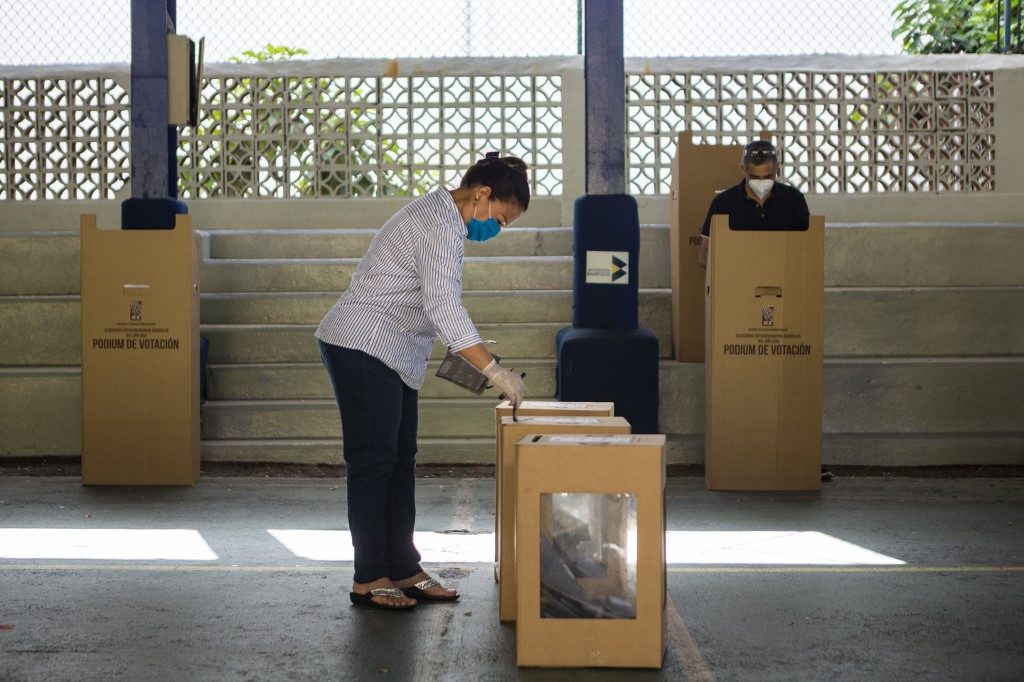SUMMARY
This is AI generated summarization, which may have errors. For context, always refer to the full article.

SANTO DOMINGO, Dominican Republic (UPDATED) – Opposition candidate Luis Abinader has claimed victory in the Dominican Republic’s presidential race after voters on Sunday, July 5, braved a worsening coronavirus outbreak to cast their ballots for a new leader and legislature.
Abinader’s rivals and the outgoing president also recognized his win, which ends 16 years of unbroken rule by the Caribbean nation’s center-left Dominican Liberation Party (PLD).
“We won, today we win, but we will never forget who we owe this victory to,” the 52-year-old businessman said from a platform before dozens of followers at his campaign headquarters in the capital Santo Domingo.
“We owe it to you, the Dominican people. That is why tonight we all won.”
According to data from the central electoral board after around 60% of ballots had been counted, Abinader gained around 1.2 million votes – around 53%.
The PLD’s candidate Gonzalo Castillo came second in a six-man field, with 838,000 votes – or 37% – according to the incomplete figures.
Castillo said the official count “shows that there is an irreversible trend and that from now on we have a president-elect…. Our congratulations to Mr. Luis Abinader.”
Outgoing President Danilo Medina also accepted the businessman’s victory, tweeting his “congratulations to the new president-elect @LuisAbinader.”
Abinader’s win was is yet to be formally announced by the electoral board.
Gunfire outside a polling station in the capital left one person dead after an argument among opposing party activists turned violent, police said.
But elsewhere, voting appeared to progress smoothly, with few disruptions despite the extra virus precautions.
“It’s pretty fluid and very well organized. The truth is I didn’t expect it,” said Maribel Roman, a 47-year-old business consultant, as she waited for her turn to vote.
The election, which was pushed back from May 17, was held despite the epidemic’s explosive spread, with the number of new COVID-19 cases hitting a record high Sunday for a third consecutive day.
Medina, who could not seek another term under the country’s constitution, was forced to impose a national lockdown, easing it only last week as parties made a final drive for votes.
‘Change is coming’
Abinader had to suspend his campaign after testing positive for the coronavirus, but recovered sufficiently to lead a rally on Wednesday, July 1.
An observer team from the Organization of American States (OAS) monitored the vote, but its leader, former Chilean president Eduardo Frei, was unable to be present because of travel restrictions.
Some 7.5 million Dominicans were eligible to cast ballots in the election.
Also up for grabs are 32 senate seats, 190 seats in the lower house and 20 representatives to the Central American parliament.
Corruption an issue
“Change is coming and the PLD is going,” Abinader, who is considered a centrist, promised hundreds of his supporters at a closing rally Wednesday.
Corruption has been a key issue after protests in recent years over the involvement of local officials in the Latin America-wide Odebrecht graft scandal.
The Brazilian construction giant has admitted to doling out $92 million in bribes in the Dominican Republic in exchange for winning public works contracts.
The country, which shares the island of Hispaniola with Haiti, ranks 137th out of 180 countries on Transparency International’s corruption index.
Virus fears
Despite health protocols at polling stations, Health Minister Rafael Sanchez Cardenas said it would be “practically impossible” not to have fresh outbreaks of COVID-19.
The pandemic has already hit polling by the Republic’s 600,000 overseas voters – representing almost 8% of the electoral roll.
Most live in the United States, Spain and Puerto Rico, where polling has been taking place. However, expatriates in Italy and Panama have not been authorized to vote because of coronavirus restrictions there.
The Dominican Republic is one of the strongest economies in the region, recording on average 6.3% growth a year between 2013 and 2018, according to the World Bank.
However, the Bank has warned that it is at risk of being pushed back into poverty because of the pandemic. – Rappler.com
Add a comment
How does this make you feel?
There are no comments yet. Add your comment to start the conversation.